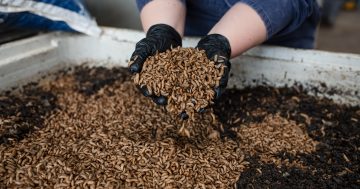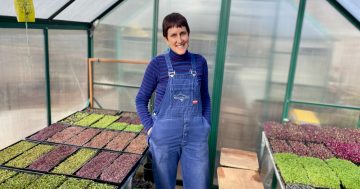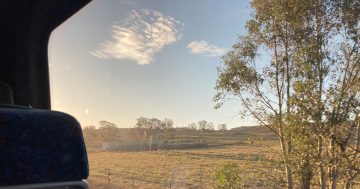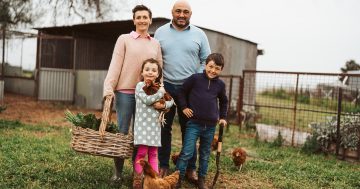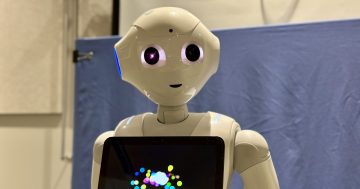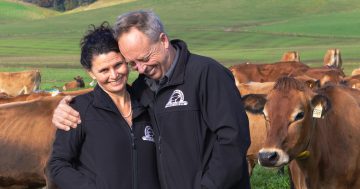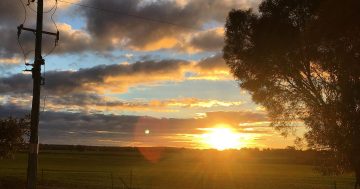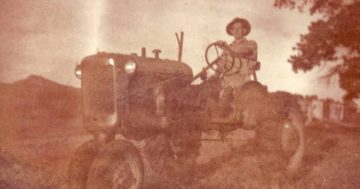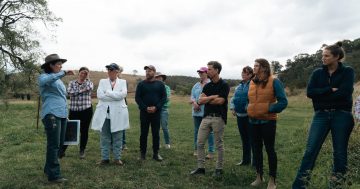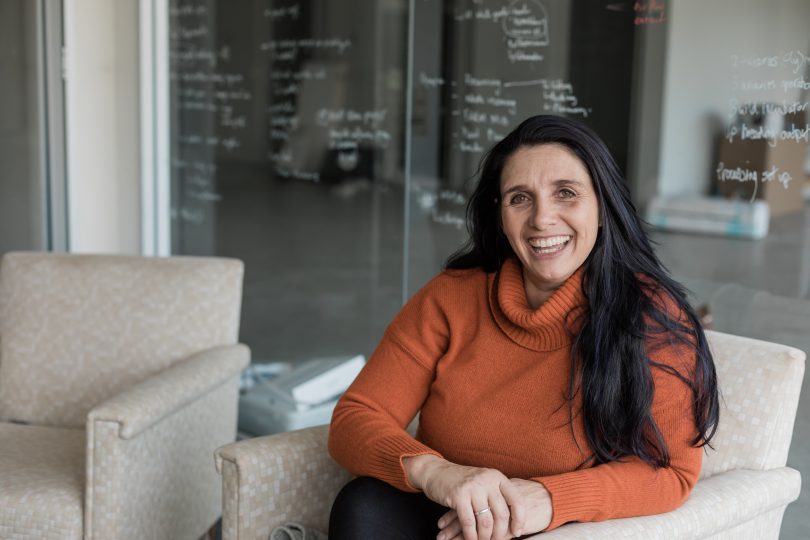
Olympia Yarger is the founder and CEO of a Canberra-based company that specialises in using insects to reduce food waste. Photo: Goterra.
Goterra founder and CEO Olympia Yarger always dreamt of becoming a farmer, but never imagined becoming a maggot farmer.
It was visiting her nonna’s piggery and battery hen farm on Mugga Lane in Canberra that inspired Olympia’s lifelong love of the land.
This passion for all things outdoors only grew when Olympia went to boarding school in Yass and weekends were spent on school friends’ farms.
“I always wanted to be around animals and I loved the ability to make something grow,” Olympia said.
However, starting a career on the land wasn’t easy when, at the age of 20, Olympia lost her son, Jeremy.
Grief drew her to an equine traineeship program in Texas in the United States, which offered her a chance to start over.
It was here that she met her now-husband Eric in the US military and, eventually, Olympia convinced him and their two beautiful children to move to Canberra.
Back in Australia, the couple was united on buying a farm but didn’t have the equity after 14 years spent overseas.
Resolute in her determination to live and work on the land, Olympia looked for other ways to make the most of her agricultural backyard.
She began experimenting with a new form of livestock feed: black soldier fly larvae.
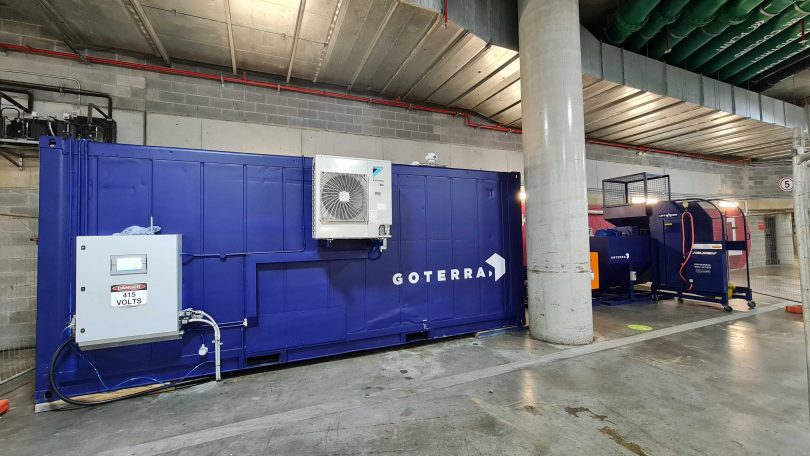
The food waste and maggots are housed in climate-controlled shipping containers. Photo: Goterra.
Using what she could find at Bunnings and The Green Shed in Canberra, Olympia began making contraptions to hold the larvae and food waste.
“The insects came straight out of my compost heap in the backyard,” she said.
“I made everything out of plastic and duct tape. It was all quite ramshackle and not very nice.”
It was a steep learning curve and Olympia, who had never been to an insect farm, learnt everything she could from the internet.
“It’s all quite difficult and hard to do if you’ve never seen anything like it before,” she added.
Olympia’s food waste management systems are the first of their kind and have grown well beyond a side hustle.
Goterra’s clients include Woolworths, Queanbeyan-Palerang Regional Council, hospitals, hotels, schools and apartment buildings.
Housed in climate-controlled shipping containers, not only do the insects reduce food waste sustainably, they also produce fertiliser and grow to become protein-rich food for chooks, fish and pets.
It’s incredible to think the humble maggot is helping reduce the 7.3 million tonnes of food that goes to waste, rots and produces methane in landfills.
Olympia says it’s overwhelming at times to think of the environmental difference she and her team are making. Especially now the business is going national, including Albury very soon, and trialling similar units capable of reducing other types of waste.
Olympia’s long-term goal is to create more opportunities for people to work in agriculture and science, technology, engineering and mathematics (STEM).
“The whole of Australia is trying to do better on wasting less, so it’s reasonable we will see less food waste,” she said.
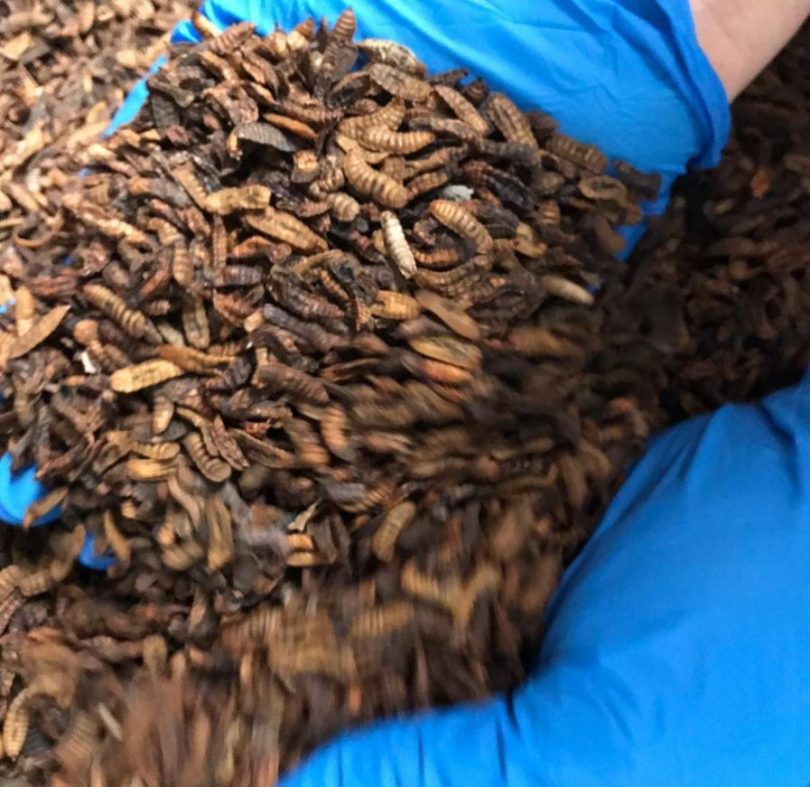
The maggots double as a protein-rich feed for pigs and chooks. Photo: Goterra.
“Our plan is not to build our business on the idea that today will be the same as tomorrow.
“We know things are changing and are looking at how we can continue to serve a purpose.”
As for Olympia’s young dream, she and Eric eventually bought their hobby farm and Olympia is proud to call herself a farmer – even if it is unconventional.
“There’s still too much stereotype and assumption around what agriculture is,” she said.
“I do consider myself a farmer – we are creating the farm systems of tomorrow – but when I’m around conventional ag I don’t admit that as confidently.
“We still think of farming as flannel shirts, sheep, cattle and crops – If it’s not that, it’s not farming.
“So there’s always that voice asking, am I really? But yes, I am.”
Original Article published by Hannah Sparks on About Regional.












